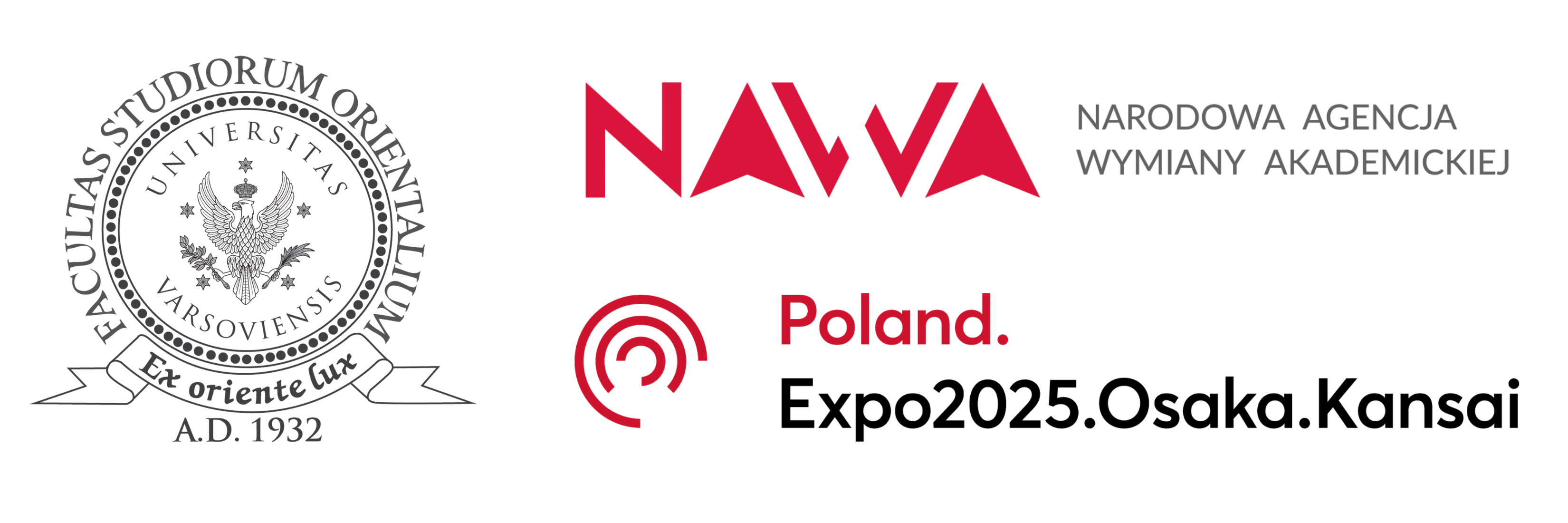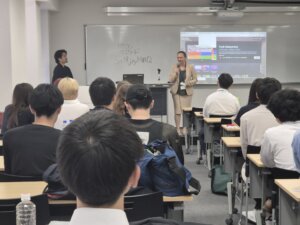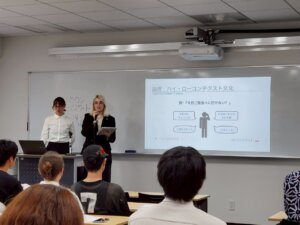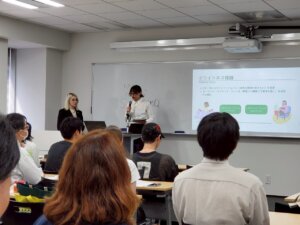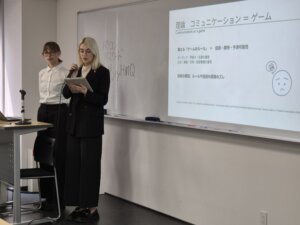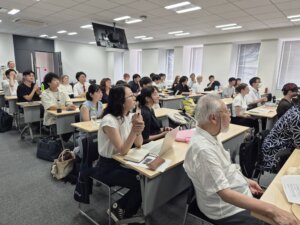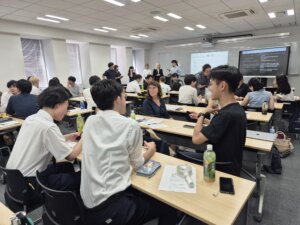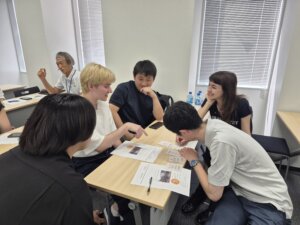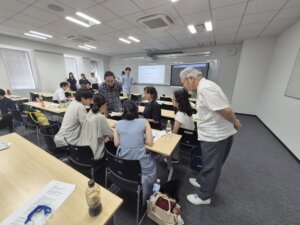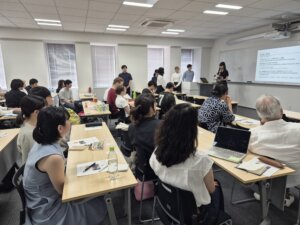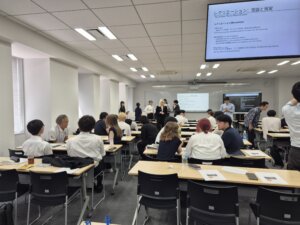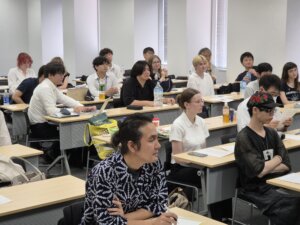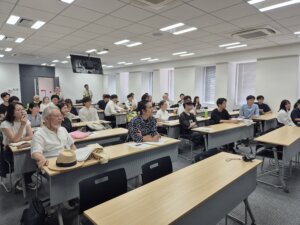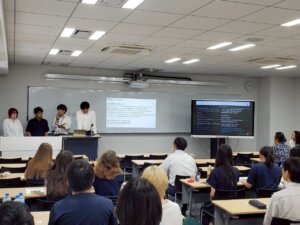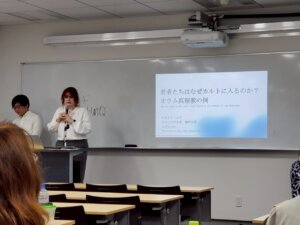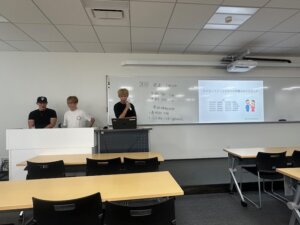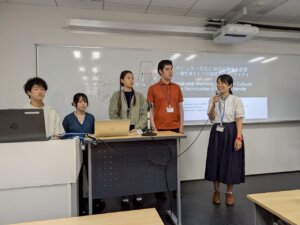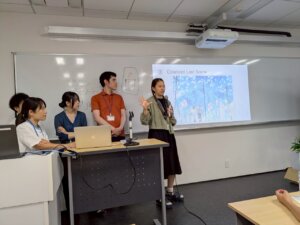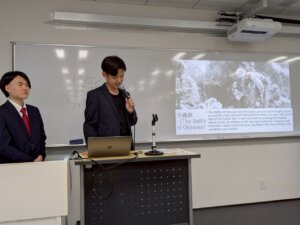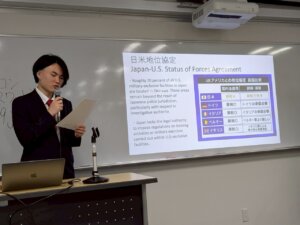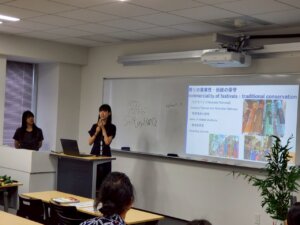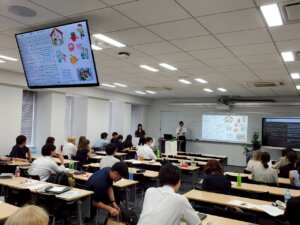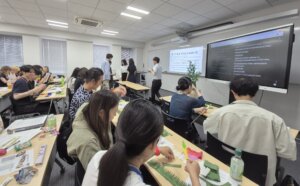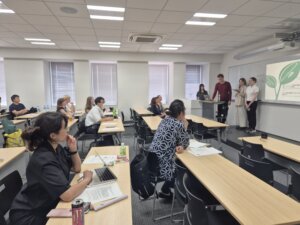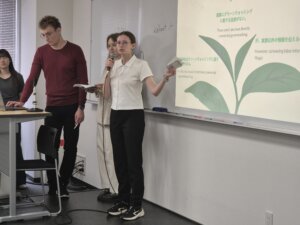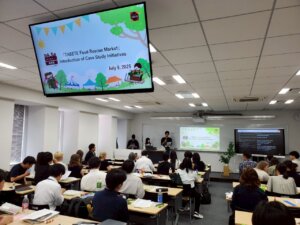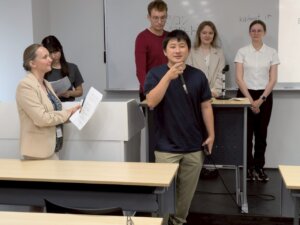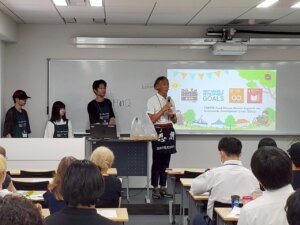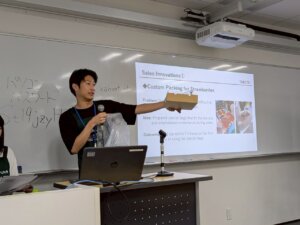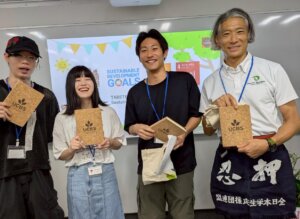9/07/2025 Warsztaty Studenckie @Yamato Daigaku
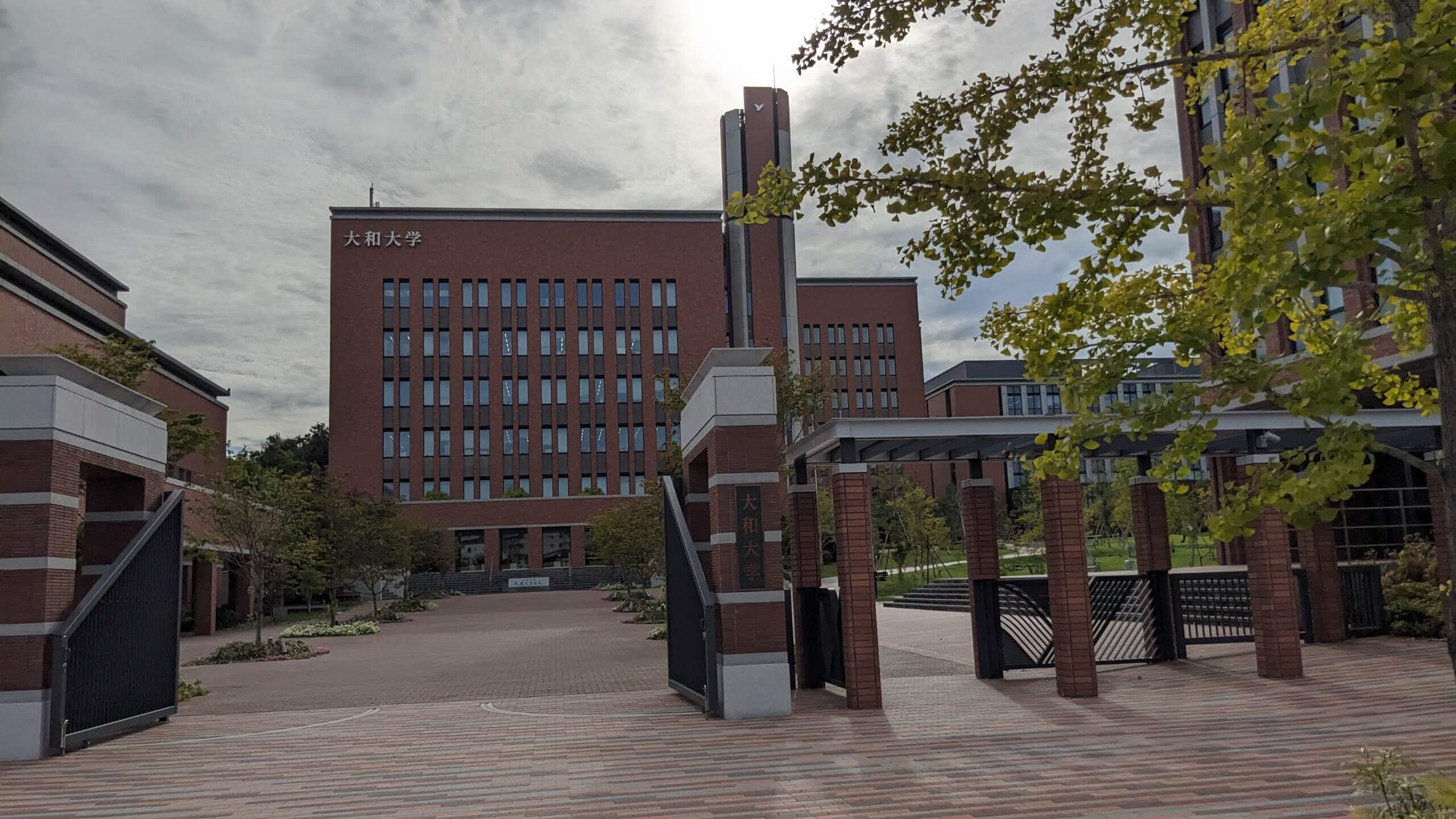
Kategoria: Sympozja i warsztaty studenckie
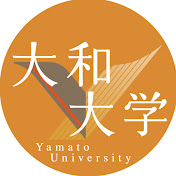 日ポ学生ワークショップ
日ポ学生ワークショップ
Japanese-Polish Student Workshops
いのちに力を与えるグッド・プラクティス
Good Practices to Empower Lives
Venue: Yamato University (Osaka)
Date: 9th July 2025, 9.30-15.00, E 301
Co-Organizers: Yamato University (YU), University of Warsaw (UW)
Cooperation: Daito Bunka University (DBU), Meijo University (MU), Chukyo University (ChKU), Kyoto University (KU)
Language: Japanese, English
W programie wydarzeń realizowanych przez Uniwersytet Warszawski podczas Wystawy EXPO 2025 znalazły się również warsztaty studenckie, które odbyły się 9 lipca na kampusie Uniwersytetu Yamato w Osace. Podejmowane zagadnienia dotyczyły m.in. problematyki zrównoważonego rozwoju oraz komunikacji międzykulturowej. Są one ściśle powiązane z hasłem przewodnim Wystawy Światowej EXPO 2025, Osaka: Designing Future Society for Our Lives (Projektowanie przyszłego społeczeństwa dla naszego życia / いのち輝く未来社会のデザイン), a także ideą stref wystawowych Saving Lives (Ratowanie życia), czy Empowering Lives (Wzmacnianie życia). Nie zabrakło także refleksji towarzyszących 80. rocznicy zakończenia II wojny światowej.
Obok studentów warszawskiej japonistyki (realizujących praktyki na terenie Wystawy Światowej w Osace, jak również studiujących w Japonii w ramach wymiany międzyuczelnianej), z dużym zaangażowaniem uczestniczyli w nich także studenci z uniwersytetów Daitō Bunka, Meijō, Chūkyō, Kiotyjskiego oraz Yamato.
Workshop Program:
9.30 Opening
Workshop I: 異文化コミュニケーション [Intercultural Communication]
9.35 言葉を超えて: 翻訳だけに頼らない異文化コミュニケーションの未来 [Lost in Translation? Polish-Japanese Intercultural Communication Beyond Words]
Team I: Dorota PIWKO (UW/Himeji Jogakuin), Gabriela LANGA (UW/Tohoku University), FUJITA Haruyuki 藤田陽之 (MU), TAKASHIMA Rika 髙島璃花 (MU), FUKUI Hironori 福井博則 (MU), TANIMOTO Hina 谷本陽菜 (MU), MIZOGUCHI Rinka 溝口凛果 (MU)
概要:ポーランド語話者と日本語話者の間における異文化コミュニケーションを、言語そのものだけでなく、文化的規範や語用論的期待の観点から検討する。学生交流や学術機関間の協働における具体的事例を通して、間接的な表現、沈黙、敬語など、コミュニケーションスタイルの相違がもたらす誤解や困難を分析する。理論的枠組みとしては、ハイコンテクスト/ローコンテクスト文化、フェイス理論、文化記号論を用いる。文化的に繊細な表現の言い換え演習などの対話的活動を通じて、直訳の限界を認識し、より効果的かつ文化的配慮に基づいたコミュニケーション戦略を考察する。
Description: This workshop explores how intercultural communication between Polish and Japanese speakers is shaped not only by language but by underlying cultural norms and pragmatic expectations. Drawing on examples from academic exchanges and institutional collaborations, the session focuses on mismatches in communication styles, such as differing uses of indirectness, silence, and politeness strategies. Key theoretical frameworks include high- vs. low-context communication, face theory, and cultural semiotics. Through interactive tasks—such as rephrasing culturally sensitive expressions across languages—participants critically examine the limitations of direct translation and develop strategies for effective, culturally informed communication.
Commentators: Asst. Prof. KOJIMA Nanako 小島奈名子准教授(YU), Urszula MACH-BRYSON (UW)
Workshop II: 文化 [Culture]
10.10 II-1: 心を豊かにしてくれる社会を目指して [Building a Society that Enriches People’s Hearts and Minds]
なぜ若者は新興宗教に惹きつけられるのか [Why are young people attracted to new religions?]
Team II-1: Natalia JURA (UW/Kobe University), TAKEDA Chihiro 武田知大 (KU), FURUYA Yosuke 古谷庸典(KU), TOYODA Koshiro 豊田航志朗 (KU)
概要:「何故若者が新興宗教に惹きつけられるのか?」というテーマから、SDGsの問題を考える。まずオウム真理教事件をテーマにカルトと若者について考察する。次に「宗教2世」に着目して現代の若者と新興宗教について考察する。
Description: This workshop examines the Sustainable Development Goals (SDGs) through the theme: “Why Are Young People Attracted to New Religions?” It begins by focusing on the Aum Shinrikyo incident to explore the relationship between cults and youth. Then the discussion shifts to the issue of second-generation religious followers (shūkyō nisei), analyzing how contemporary young people engage with new religious movements.
Commentators: Prof. Agnieszka KOZYRA (UW), Dr. KAMEDA Masumi 亀田真澄 (ChKU), Asst. Prof. KOJIMA Nanako 小島奈名子准教授(YU)
10.50 II-2: 自然の象徴 [Symbolism of Nature]
Team II-2: Zuzanna FIDZIŃSKA (UW/Ochanomizu University), Katarzyna LORENS (UW / Kogakkan University), Nikodem BERNAT (UW)
概要:風習、伝統、宗教は、私たちの自然との関係をどのように語っているのか。
Description: How customs, traditions and religion talks about our relation with nature?
Commentator: Asst. Prof. Anna BATORCZAK (UW)
11.20 II-3: 伝統文化を通じた日本・ポーランドの国際交流 [International Exchange between Poland and Japan through Traditional Culture]
日本とポーランドの年中行事を体験しよう![Let’s Experience Annual Events in Poland and Japan!]
Team II-3: Gabriela LANGA (UW/Tohoku University), TAKASHIMA Rika 髙島璃花 (MU), FUKUI Hironori 福井博則 (MU), FUJITA Haruyuki 藤田陽之 (MU), TANIMOTO Hina 谷本陽菜 (MU), MIZOGUCHI Rinka 溝口凛果 (MU)
本ワークショップでは、日本とポーランドにおける伝統的な年中行事、とりわけ七夕祭りとポーランドの「Niedziela Palmowa」に焦点を当て、それぞれの行事を比較・探究します。これらの行事の文化的な意義を紹介し、共通点や表現・象徴性における相違点を明らかにします。また、文化的比較に加えて、これらの伝統が現代のグローバルな課題とどのように交差しているのか、特に国連の持続可能な開発目標(SDGs)の文脈の中で考察します。装飾材料の環境への影響、商業化の影響、祭礼装飾の適切な廃棄・再利用の方策といった問いに焦点を当て、民俗文化の持続可能性と継承の可能性について議論します。さらに参加型の活動として、参加者は七夕の飾りやポーランドの「Palma Wielkanocna」の制作を体験し、異文化理解を深めながら、伝統的な実践が現代社会の中でどのように持続的に発展し得るかを考察します。
Description: This workshop aims to explore and compare traditional annual celebrations in Japan and Poland, focusing particularly on the Tanabata Festival and Niedziela Palmowa (Palm Sunday). Led by students, the session will present the cultural significance of these events, highlighting both shared themes and distinct differences in their expression and symbolism. In addition to cultural comparison, the workshop will examine how these traditions intersect with contemporary global challenges, particularly in the context of the United Nations Sustainable Development Goals (SDGs). Special attention will be given to the sustainability and continuity of folk traditions, addressing questions such as the environmental impact of decorative materials, the effects of commercialization, and strategies for responsible disposal and reuse of festive ornaments. As an interactive component, participants will engage in hands-on creation of traditional decorations — Tanabata streamers and Polish Palma Wielkanocna — as a means of fostering intercultural understanding and reflecting on how traditional practices can evolve sustainably in modern contexts.]
Commentators: Prof. Agnieszka KOZYRA (UW), Assoc. Prof. YAJIMA Akira 矢嶋光准教授 (MU)
Workshop III: 循環型社会 [Sound Material-Cycle Society]
11.5o 大東文化大学と埼玉県東松山市のフードロスへの取り組み: Tabeteレスキューという取り組みを通して [An Initiative for Zero Food Loss: A Challenge of DBU and Higashi Matsuyama city through ‘Tabete Rescue‘ Project]
Team III: 「TABETEレスキュー・プロジェクトチーム」DBU ‘TABETE Rescue’Project Team @ Center for Collaborative Research and Outreach: ITANI Haruki 猪谷春輝 (DBU), KOSHIBA Mikiaki 小柴幹陽 (DBU), MURATA Ririka 村田梨里花 (DBU)
Moderator: ŌHATA Eiji 大畑栄司 (大東文化大学地域連携センター事務長)
概要: 大東文化大学のキャンパスのある埼玉県東松山市で売れ残った農産品を東武鉄道の協力を通じて大東文化大学学生が池袋で販売している。また子ども食堂での食材としても利用している。政府の賞を受賞したこの取り組みを紹介しながら、日本のフードロスへの取り組みを考える。
Description: Through the cooperation of Tobu Railway Company, Daito Bunka University students sell unsold agricultural products at the Ikebukuro Station from Higashi Matsuyama City in Saitama Prefecture, where the Daito Bunka University campus is located. They are also used as foodstuffs in a children’s cafeteria. In this workshop this government award-winning initiative will be introduced and with the participants Japan’s approach to food loss issues is to be discussed.
12.25 Lunch Break
Workshop IV: 戦争の記憶 と平和への取組 ~ポーランド日本の比較の視点から~ [War Memories and Peace Initiatives: From the Perspective of Poland and Japan]
13.10 IV-1.どのように戦争を総括し、未来につなげるのか: 沖縄とワルシャワから見た戦後80年における戦争と平和 [Looking Back and Forth at the 80th Anniversary of the END of WWII from Okinawa and Warsaw]
Team IV: FUKUSHIMA Iori 福島伊織 (DBU), IWAOKA Rimon 岩岡里門 (DBU)
概要:報道によれば、日本政府は、戦後80年の今年、戦争の検証を予定している。沖縄、広島、長崎はアジア太平洋戦争の激戦地であるが、ワルシャワはヨーロッパ戦線に於ける激戦地であり、悲劇の舞台である。本報告では、第二次世界大戦の激戦地となった沖縄に視点をすえ、日本の戦争突入と敗戦までの経緯を振り返り、また犠牲者の感情に注意をはらいながら、戦争の記憶を探り、その継承をめぐる問題点を整理しながら、戦後80年をへた日本とポーランドから世界へのメッセージを考える。
Description: Allegedly Japanese government is going to make a statement about WWII this year. Okinawa-Hiroshima-Nagasaki and Warsaw, as they were the sites of fierce fighting, witnessed the tragedies of World War II either in Asia-pacific and Eastern Europe. In this workshop the students will trace the process of WWII and elaborate on the meaning of the battle of Okinawa and the tragedy of Warsaw. Also stressing the importance of war memories and the viewpoints of the war victims, they will discuss the important messages we should pass on to the world 80 years on.
13.40 IV-2. 戦争記憶と表象:犠牲者としての国民アイデンティティ [War and Memory in Popular Culture: The Victimization of National Identity]
Team IV-2: Dr. KAMEDA Masumi亀田真澄 (ChKU), EZAKA Masahiro Brian 江坂真宏ブライアン (ChKU), HAYASHI Ami 林杏美 (ChKU), KOBAYASHI Miyu 小林美裕 (ChKU), MACHIDA Kei 町田景 (ChKU)
概要: 現代のポピュラーな文学・映画作品等における、日本人の戦争経験の表象を分析した上で、日本
人を犠牲者と位置付ける国民アイデンティティのあり方について検討し、ポーランドの事例とも比較する。[This session will examine how the Japanese experience of World War II is represented in recent popular culture. It will focus on how these representations portray the Japanese people as victims and will also compare these depictions with the representation of war memory in Poland.]
14.10 IV-3. 平和とスポーツ ~エスキーテニスの普及に向けて [Peace and Sports. Promoting the spread of ESCI tennis]
Team IV-3: YAMADA Nodoka 山田和佳 (YU)、ISHIKAWA Fumito 石川郁士 (YU), TATSUMI Toshiki 巽俊樹 (YU), IRISAWA Yu入澤優羽 (YU), FURUTA Nana 古田菜 (YU)
概要: エスキーテニス(ESCI TENNIS)は原爆投下直後の広島市で、スポーツを通じてユネスコ憲章の平和精神を広める目的で開発された。このスポーツは広島を中心に普及し、市民の健康増進と交流に貢献してきた。このセッションではエスキーテニスが戦後の復興過程で果たした役割を説明するとともに、学生による展示試合をおこなう。
Description: ESCI TENNIS was developed in Hiroshima immediately after the atomic bombing with the aim of promoting the spirit of peace enshrined in the UNESCO Constitution through sports. This sport has spread mainly in Hiroshima, contributing to the health and exchange of citizens. This session will explain the role that ESCI TENNIS played in the postwar reconstruction process and feature exhibition matches by students.
Commentators: Prof. MATSUBAYASHI Kaoru 松林薫教授 (YU), Prof. TAKEDA Tomoki (DBU), Asst. Prof. Katarzyna STARECKA (UW), Urszula MACH-BRYSON (UW), HASUMI Koshiro 蓮見皇志郎 (DBU), NOGUCHI Kosei 野口航成 (DBU)
14.45 Closing remarks
Projekt finansowany przez Narodową Agencję Wymiany Akademickiej w ramach Programu Międzynarodowe Wydarzenie Naukowe na Wystawie Światowej Expo 2025 w Osace, Kansai (nabór 2024/Kierunek EXPO 2025 – umowa nr BPI/OSA/2024/1/00020/DEC/01).
